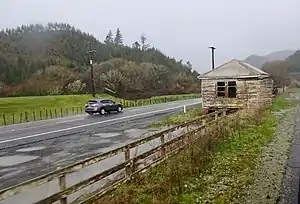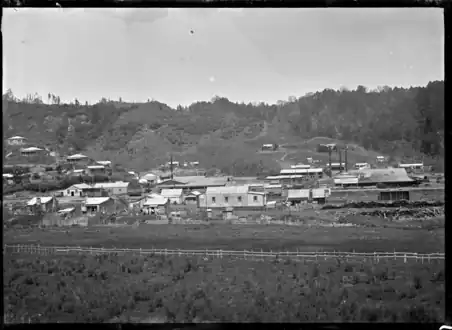Mangapehi railway station | |||||||||||
|---|---|---|---|---|---|---|---|---|---|---|---|
 Mangapehi station in 2018 | |||||||||||
| General information | |||||||||||
| Location | New Zealand | ||||||||||
| Coordinates | 38°31′01″S 175°18′28″E / 38.516878°S 175.307722°E | ||||||||||
| Elevation | 285 m (935 ft) | ||||||||||
| Line(s) | North Island Main Trunk | ||||||||||
| Distance | Wellington 449.47 km (279.29 mi) | ||||||||||
| History | |||||||||||
| Opened | 1 April 1901 | ||||||||||
| Closed | Passenger after Sep 1980 Goods 31 March 1987 | ||||||||||
| Rebuilt | 8 January 1950 | ||||||||||
| Electrified | June 1988 | ||||||||||
| Services | |||||||||||
| |||||||||||
Mangapehi[1] (or Mangapeehi)[2] was a flag station on the North Island Main Trunk line, in the Waitomo District of New Zealand. It was 5.89 km (3.66 mi) north of Poro-O-Tarao and 5.15 km (3.20 mi) south of Kopaki.[3]
Ellis & Burnand had a sawmill at Mangapehi from 1901[4] until 1968.[5]
Station move
In 1950 the station was moved almost a kilometre north, away from the sawmill,[6][7] at a cost of £13,405.[8] In that year it had 23,636 passengers, 4 staff and railed 148,093 board feet (349.46 m3) of timber and 28,633 sheep and pigs, earning £3,256 from passengers and £85,473 from freight.[9]
Tramway
A tramway was built into the bush to the east by Ellis and Burnand, initially with 11 mi (18 km) in 1903,[10] and extended further in 1904.[11] By 1909 it was over 14 mi (23 km), which had cost an average of over £1,000 per mile.[12] At 15 mi (24 km) it was slightly longer in 1922.[13] and by 1939 there were over 26 mi (42 km) of tramway[14] and 58 km (36 mi) when trucks took over in the 1950s.[5]
Gradients were up to 1 in 15, requiring the use of geared Climax locos from 1905,[15] which replaced horses[16] on wooden rails.[5] It also linked the station to the coal mines at Maniaiti / Benneydale.[6] The 1904 Climax is now in the Tokomaru Steam Engine Museum,[17] after ending service in 1954 and being briefly joined by another E & B Climax from their Manunui tramway.[18]
Coal from the Mangapehi mine used the line between 1936 and 1952.[5]
Gallery
.jpg.webp) Mangapehi railway station and Ellis and Burnand sawmill before 1930
Mangapehi railway station and Ellis and Burnand sawmill before 1930 "Climax" locomotive at Mangapehi, in 1920 on Ellis & Burnand tramway.
"Climax" locomotive at Mangapehi, in 1920 on Ellis & Burnand tramway. Mangapehi railway station and settlement in 1920
Mangapehi railway station and settlement in 1920
References
- ↑ "NZGB Gazetteer". gazetteer.linz.govt.nz. Retrieved 28 March 2020.
- ↑ "Stations". NZR Rolling Stock Lists. Retrieved 28 March 2020.
- ↑ New Zealand Railway and Tramway Atlas (Fourth ed.). Quail Map Co. 1993. ISBN 0-900609-92-3.
- ↑ Cleaver, Philip (February 2011). "Maori and the Forestry, Mining, Fishing, and Tourism Industries of the Rohe Potae Inquiry District 1880–2000" (PDF). Waitangi Tribunal.
- 1 2 3 4 King, Carolyn M.; Gaukrodger, D. John; Ritchie, Neville A. (7 November 2015). The Drama of Conservation: The History of Pureora Forest, New Zealand. Springer. ISBN 978-3-319-18410-4.
- 1 2 "Ongarue one inch map, sheet N92". www.mapspast.org.nz. 1 November 1956. Retrieved 28 March 2020.
- ↑ "Ongarue one inch map, sheet N92". www.mapspast.org.nz. 1974. Retrieved 28 March 2020.
- ↑ "DETAILS OF ESTIMATES FOR THE WORKING RAILWAYS ACCOUNT". paperspast.natlib.govt.nz. 31 March 1951. Retrieved 28 March 2020.
- ↑ "STATEMENT No. 18 Statement of Traffic and Revenue for each Station for the Year ended 31st March, 1950".
- ↑ "The Main Trunk Line". The New Zealand Herald. 6 May 1903. p. 3. Retrieved 23 March 2018.
- ↑ "Local and General. WAIKATO TIMES". paperspast.natlib.govt.nz. 23 March 1904. Retrieved 29 March 2020.
- ↑ "REPORT of Commission on the Timber and Timber-Building Industries; together with Minutes of Proceedings and of Evidence". 1909.
- ↑ "A Great Industry! Ellis & Burnand Ltd. WAIKATO TIMES". paperspast.natlib.govt.nz. 2 May 1922. Retrieved 29 March 2020.
- ↑ "Page 4 Advertisements Column 6 KING COUNTRY CHRONICLE". paperspast.natlib.govt.nz. 2 June 1939. Retrieved 29 March 2020.
- ↑ "Local and General. WAIKATO TIMES". paperspast.natlib.govt.nz. 14 January 1905. Retrieved 29 March 2020.
- ↑ "Waikato Argus". 18 April 1905. p. 2. Retrieved 17 February 2018.
- ↑ "THE MUSEUM". Tokomaru Steam Engine Museum. Retrieved 29 March 2020.
- ↑ "Climax Locomotives". www.trainweb.org. Retrieved 29 March 2020.